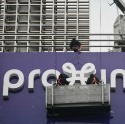Eurobites: Belgium's Proximus takes it to the bank
Also in today's EMEA regional roundup: Telefónica is booking hotel rooms at MWC; Nokia wants bodies in the office; BT in talks with News UK over future of TV sport offering.

Also in today's EMEA regional roundup: Telefónica is booking hotel rooms at MWC; Nokia wants bodies in the office; BT in talks with News UK over future of TV sport offering.
Belgian's Proximus is following in the footsteps of Orange and launching its own bank, which it promises will allow users to set up a new account in less than five minutes, automatically split bills when they're on a boozy night out with thier pals and monitor the effect of their purchases on the environment via a "personal CO2 dashboard." Indeed, Proximus reckons that Banx, as the service is called, "brings a touch of fun and delight to daily banking." (Steady there, chaps.) Banx is described as the fruit of a collaboration between Proximus and Belfius, which is an existing bank based in Brussels.
BT, Deutsche Telekom, Vodafone and Cisco are just some of the big names that have made it clear that they won't be attending Mobile World Congress in Barcelona in person next week, but Telefónica definitely will be there, the Spanish operator describing its decision as "a clear commitment to a progressive return to normality." Telefónica's booth will cover 952 square meters and will play host to various demos, or "transformation experiences" as the operator styles them. All the demos will also be available virtually on Telefónica's MWC "digital twin." (See GSMA struggles to justify MWC's physical existence.)
While some tech companies have accepted that a fair proportion of employees want to work from home permanently once post-COVID-19 normal service is resumed, Nokia is taking a firmer line. In new guidelines that come into force on January 1, 2022, the Finnish vendor has decreed that employees must come into the office at least two days a week (unless they are on vacation, obviously). The vast majority of Nokia's employees have worked remotely during pandemic, and the company's existing work-from-home policy remains in place until the end of the year.
BT is exploring a potential partnership with News UK, the newspaper publisher owned by Rupert Murdoch, to help it cope with costs incurred by its BT Sport pay-TV arm, according to a report in the Telegraph. When Gavin Patterson ran the company, BT threw itself into sports broadcasting in a big way, but since Philip Jansen took charge in early 2019 its enthusiasm for screening expensive top-flight soccer has waned considerably. (See BT Sport sale would aid fiber rather than football focus.)
Transport for London (TfL), the body that runs most of the public transport network in the UK capital, has awarded a 20-year concession to BAI Communications (BAI) to help it improve mobile coverage across the whole network, a good part of which dates from Victorian times. According to TfL, uninterrupted 4G mobile coverage has already been introduced on the eastern half of the Jubilee line and will be expanded in phases to ticket halls, platforms and tunnels on the network over the next three years, with all stations and tunnels due to have 4G mobile coverage by the end of 2024. BAI has experience of deploying communications networks in New York, Toronto and Hong Kong, amongst other locations. (See Underground Upgrade.)
Neyðarlínan ohf, the state-owned Icelandic telecom provider which operates the 112 national emergency number, has completed the trial of an off-grid hydrogen power system from Israeli fuel-cell technology company Gencell Energy. The system ran for 1,500 continuous working hours in challenging weather conditions including sub-zero temperatures, heavy rains and strong winds. (Well, it is Iceland.)
— Paul Rainford, Assistant Editor, Europe, Light Reading
Read more about:
EuropeAbout the Author(s)
You May Also Like












